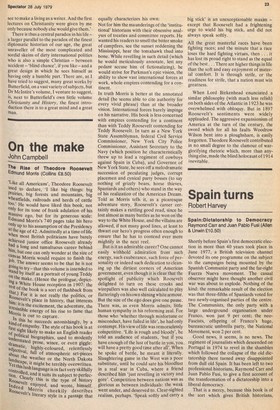On the make
John Campbell
The Rise of Theodore Roosevelt Edmund Morris (Collins £8.50) `Like all Americans', Theodore Roosevelt used to declare, 'I like big things: big prairies, big forests and mountains, big wheatfields, railroads and herds of cattle too.' He would have liked this book, not Only for its tone of frank adulation of his massive ego, but for its generous scale: Edmund Morris's 740 pages take his hero only up to his assumption of the Presidency at the age of 42. Admittedly at a time of life When most British politicians have barely achieved junior office Roosevelt already had a long and tumultuous career behind him, but one can only wonder at the size of c.allvas Morris would require to finish the Job. The answer seems to be that he Is not going to try — that this volume is intended to stand by itself as a portrait of young Teddy On the make. (Hence the prologue, depictmg a White House reception in 1907: the rest of the book is a sort of flashback from that.) For it is not really the politics, or ,00sevelt's place in history, that interests alm:it is the excitement, the adventure, the irresistible energy of his rise to fame that Morris is out to capture. In this he succeeds astonishingly, by a ,K,Ind of empathy. The style of his book is at first sight likely to make an English reader of political biographies, used to modestly understated prose, wince, or even giggle: acif.amatic, highly-coloured, relentlessly Fljectival, full of atmospheric set-pieces rout the weather or the North Dakota PldscaPe, it might be terribly overwritten. et tills lush language is in fact very skilfully Controlled, and it suits its subject to perfect_l°a. Clearly this is the type of history oosevelt enjoyed, and wrote, himself. Morris cheekily describes oosevelt's literary style in a passage that equally characterizes his own: Not for him the maunderings of the 'institutional' historians with their obsessive analyses of treaties and committee reports. He wanted his readers to smell the bitter smoke of campfires, see the sunset reddening the Mississippi, hear the tomahawk thud into bone. While revelling in such detail (which he would meticulously annotate, lest any pedant accuse him of fictionalizing), he would strive for Parkman's epic vision, the ability to show vast international forces at work, whole empires contending for a continent.
In truth Morris is better at the annotated detail (he seems able to cite authority for every vivid phrase) than at the broader vision. International forces barely impinge on his narrative. His book is less concerned with empires contending for a continent than with Teddy Roosevelt contending for Teddy Roosevelt. In turn as a New York State Assemblyman, federal Civil Service Commissioner, New York City Police Commissioner, Assistant Secretary to the Navy (which position he characteristically threw up to lead a regiment of cowboys against Spain in Cuba), and Governor, of New York State, he sees off a melodramatic succession of peculating judges, corrupt placemen and cynical party bosses (to say nothing of grizzly bears, horse thieves, Spaniards and others) who stand in the way of his realization of the American Dream. Told as Morris tells it, as a picaresque adventure story, Roosevelt's career certainly makes a rattling good read, since he lost almost as many battles as he won on the way to the White House, and the villains are allowed, if not many good lines, at least to thwart our hero's progress often enough to ensure that he has to contend ever more mightily in the next reel.
But is it an admirable career? One cannot easily withhold admiration from such energy, such exuberance, such force of personality or indeed such dedication to cleaning up the dirtiest corners of American government, even though it is clear that the spotlight of publicity which Roosevelt delighted to turn on these crooks and wirepullers was also well calculated to play flatteringly on hisown shining white armour. But the size of the ego does give one pause. There was, as even Morris admits, little human sympathy in his reforming zeal. For those who 'whether through misfortune or misconduct, have failed in life', he had only contempt. His view of life was remorselessly coMpetitive. 'Life is rough and bloody', he told an audience of students, 'but if you have enough of the lust of battle in you, you will have a pretty good time after all'. When he spoke of battle, he meant it literally. Slaughtering game in the West was a poor substitute, until he could sate his bloodlust in a real war in Cuba, where a friend described him 'just revelling in victory and gore'. Competition between nations was as glorious as between individuals: the weak went under, and deserved to. Clear-sighted realism, perhaps. 'Speak softly and carry a big stick' is an unexceptionable maxim — except that Roosevelt had a frightening urge to wield his big stick, and did not always speak softly.
All the great masterful races have been fighting races; and the minute that a race loses the hard fighting virtues, then . . . it has lost its proud right to stand as the equal of the best. . .There are higher things in life than the soft and easy enjoyment of material comfort. It is through strife, or the readiness for strife, that a nation must win greatness.
When Lord Birkenhead enunciated a similar philosophy (with much less relish) on both sides of the Atlantic in 1923 he was overwhelmed with obloquy. But in 1897 Roosevelt's sentiments were widely applauded. The aggressive expansionism of America at the turn of the century, the sword which for all his faults Woodrow Wilson bent into a ploughshare, is easily forgotten. Theodore Roosevelt contributed in no small degree to the clamour of warglorifying rhetoric which, more than anything else, made the blind holocaust of 1914 inevitable.






































 Previous page
Previous page